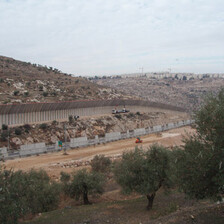The Electronic Intifada 23 March 2020

Palestinian protesters gather during a demonstration to demand the right to return to their homeland at the Israel-Gaza boundary in the central of Gaza Strip on March 30, 2019.
APA imagesTime passes slowly for Nadira al-Imam.
Her son, Moataz Abu Eid, 21, was detained by Israeli troops during a protest as part of the Great March of Return in late April 2018. He has been in an Israeli prison ever since and no one has been able to visit.
He has left a vacuum, felt especially keenly by his mother.
“He is my only son, he means everything to me,” said Nadira, 46, whose three adult daughters are all married and live away from her.
Meanwhile, she has only questions.
“Why did they take him away? He was peacefully protesting. Why do they deprive me from even paying him a visit?”
Nadira, a divorcee, is alone now. Moataz was the only child still at home.
“I work for long hours every day to prepare meals for families,” Nadira said. She is hired by a charity to cook for others, but has had to take extra work without her son to help her.
“If my son was with me I would not have to work so much,” she added.
Nadira suffers from hypertension. She needs rest and help from her children.
Yet she remains proud of her son. Moataz finished his school-leaver exam – the tawjihi – inside prison and has begun a higher education course in social services.
For now, all Nadira wants is a visit.
“I want to visit him, even if from behind glass and walls,” she told The Electronic Intifada. “I want to make sure he is fine. I think of him all the time, how he spends these long hours away from us and his friends and relatives.”
Exceptional cases
Moataz was detained with two others in the eastern boundary area outside Khan Younis, in the southern Gaza Strip. Moataz, Salim Abu Daher and Ahmad Amawi were eventually charged with attempting to fly incendiary kites across the boundary from Gaza.
The three, whose families all reject the charges as false, were originally sentenced to 10 years in prison by a military court before the sentence was lowered to five years.
They join nearly 300 Palestinians from Gaza now imprisoned by Israel, and are among the only ones arrested while participating in the Great March of Return protests.
The Israeli military’s response to these demonstrations has otherwise been brutal. More than 200 have been killed and nearly 30,000 injured.
By end of February, according to prisoner rights group Addameer, Israel held a total of 5,000 Palestinian prisoners.
Jawaher Abu Daher, 21, explained the circumstances surrounding the detention of her brother, Salim, 23.
“My oldest brother was passionate about the Great March of Return and everything about it. He and Moataz and Ahmad were enthusiastic participants. They were also unemployed and saw the march as a way to try to end the siege and alleviate Gaza’s poverty.”
The three men participated several times in the protests, but on that particular Friday none of them returned. Their families were deeply worried.
“We heard in the news that there had been clashes and smoke was rising from the area,” Jawaher remembered. “It was not until the next day that we heard on Israeli media that the army had captured three young men claiming that they were trying to get closer to the fence.”
Salim is the eldest in his family; he has eight sisters and one little brother.
His detention has caused great distress for the family. His mother’s health deteriorated after his capture, and it took her two months to accept the news.
Amal Abu Eid, Salim’s wife, was five months pregnant when her husband was detained.
“His detention shocked us. We were waiting for our baby to be delivered to lighten our life, but I did not know that his father would not be here to see that day,” Amal said.
Born without a father
Now she is praying for Salim’s release so he can rejoin the family.
For now, Amal is forced to raise their 1-year-old baby, Younis, alone.
Unlike the other families, though, Amal and Younis have managed to visit Salim, even if only twice.
After delivering her baby, Amal went to the International Committee for the Red Cross in Gaza to request a permit to visit her husband with her new-born son. Classed as a humanitarian case, they were granted a permit to visit Ramon Prison, where Salim was being held.
“Younis was six months old and the trip was very tiring for us,” Amal remembered. “And I was shocked to see how much Salim had changed, he looked so tired and sad. We all burst into tears. He was trembling when he carried his son for the first time. He hugged him a lot and did not want to leave him at all.”
The visit lasted just 40 minutes after some seven hours of travel and inspection. Two months later, Amal and her baby were permitted another visit that also lasted for less than an hour.
Since then, however, nothing.
“In the last six months, I have put in four requests, but every application has been rejected without explanation,” Amal said.
Ahmad Amawi’s family, like Moataz Abu Eid’s, have been denied any permits to visit. He and his wife Yasmin had been married two years when he was captured, but do not have children.
“I miss my husband, I dream to see him again,” Yasmin said. “I am not permitted to visit him and this is deeply distressing. I want to start a family just like any other couple.”
Isra Saleh el-Namey is a journalist from Gaza.





